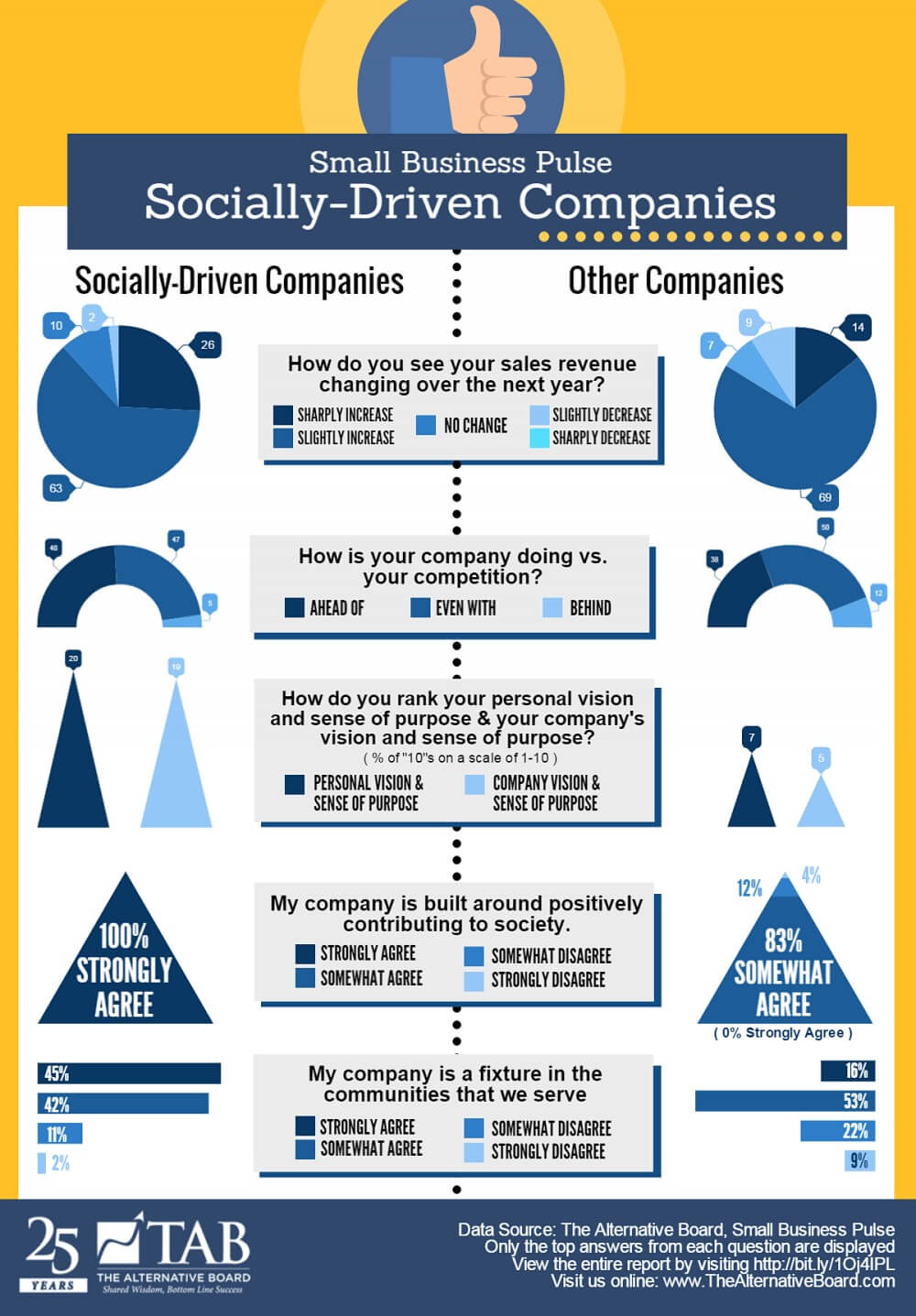This is a high-level summary of our key findings from the March 2015 Small Business Pulse Survey. This survey concentrated on socially driven companies and insights from running these types of businesses. The survey was taken by 350 business owners. We define socially driven companies as those that selected “strongly agree” to the following question:
My company is built around positively contributing to society.
38% of businesses in our survey selected strongly agree to this question.
Profile of Survey Participants
- 89% of respondents have been in business for at least 8 years. 50% of respondents have been in
business for more than 20 years.
- 25% of the respondents have annual revenue of $5 million or more. An additional 39% have revenue between $1 million and $5 million.
- 51% of respondents have 2-9 employees and 44% have 10-49 employees. The mean number of
employees is 25.
- The most common industry sectors are Professional Services, Manufacturing and Construction.
- Respondents came from the US, Canada, the UK, New Zealand and Ireland.
Key Observations from Socially-Driven Companies
Here are some key observations from those companies that identify themselves as socially driven companies compared to those that do not.
Age difference?
- There may be a perception that owners of socially driven companies are run by younger owners.
- That’s not true. In fact, the average age of owners of socially driven companies (57.1 years) is slightly higher than those of other companies (55.1 years).
Socially Driven Companies Are Not Non-Profits
Another misperception about socially driven companies is that they only exist for the greater good and aren’t that interested in profits. This is not true either.
- When asked which response best describes your company, only 25% of socially driven companiesselected “a business for good”. This compares to 14% of other companies. This is a big difference.
- However, an identical 44% of socially driven and other companies selected “a business for results.”
- 31% of socially driven companies selected “a business for profit” compared to 42% of other businesses.
While there are material differences between 2 of these responses for both groups, 75% of socially driven
businesses are “for results” or “for profit.” At the end of the day, they are still profit-making businesses where the owners manage their businesses to achieve results.
Socially Driven Business Owners Appear to be more Optimistic
When we asked respondents about how their revenue changed over the past year, the results for socially driven companies and other companies were very similar.
But, when we asked them In one year from now, how do you anticipate your sales revenue changing? the results were substantially different.
- Nearly twice-as-many socially driven business owners expected revenue to sharply increase (26%) compared to 14% of other companies.
- Overall, all types of businesses expect to grow revenue in the next year. 89% of socially driven
companies expect to grow revenues compared to 83% of other businesses.
- While only 2% of socially driven respondents anticipate a decrease in revenue over the next year, 10% of other business owners anticipate a decrease.
These are very significant differences, especially those owners expecting sharp increases. Some of this difference can be attributed to differences industries with less socially driven companies in manufacturing and construction. However, these differences are significant enough to conclude that socially driven business owners are generally more optimistic about future growth prospects.
Does a Socially Driven Company Have a Competitive Advantage?
We asked business owners Today, how is your company faring against the competition, overall?
- 48% of socially driven companies selected “ahead of the competition” compared to 38% of other companies.
- Only 5% of socially driven companies felt they were “behind the competition” compared to 12% of other companies.
This finding also reflects potential optimism of socially driven company owners. However, owners of socially driven companies are likely to see their social purpose as being an important distinction compared to their competitors and therefore a genuine competitive advantage.
Socially Driven Owners Have Stronger Personal and Business Visions
- 20% of socially driven owners selected a 10 when asked “how would you rate your own personal vision and sense of purpose” compared to 7% of other owners. Other owners more commonly selected 7 or 8 for the strength of their personal vision.
- 19% of socially driven owners selected a 10 when asked “how would you rate your own company’s vision and sense of purpose” compared to 5% of other owners. Other owners more commonly selected 7 or 8 for the strength of their company vision.
Socially Driven Companies are Fixtures in Their Communities
One of the strongest differences in the survey was in response to the question My company is a fixture in the communities that we serve.
- 45% of socially driven companies selected Strongly Agree
- Compared to 16% of other businesses
Some Cultural Observations
The following compares other select responses between the two types of companies who responded to our survey.
- When asked about what best describes how they achieve success, 65% of socially driven companies
selected by emphasizing human connections and relations compared to 59% of other businesses. Interestingly, a majority of both types of businesses selected this option over setting goals and accomplishing tasks. This reflects the importance that all owners place on their employees, customers and partners.
- More socially driven companies strongly agree with the following statement (85%) than other
businesses (69%): My company pursues win-win relationships with customers, employees, partners and other key stakeholders.
- More socially driven companies strongly agree with the following statement (68%) than other
businesses (55%): My company listens closely to what our stakeholders think of us.
TAB Australia
TAB Austria
TAB Canada
![Chile Chile]() TAB Chile
TAB ChileTAB Czech Republic
TAB England
TAB France
TAB Germany
TAB India
TAB Ireland
TAB Israel
TAB Mexico
TAB Moldova
![Netherlands Netherlands]() TAB Netherlands
TAB NetherlandsTAB New Zealand
TAB Portugal
TAB Romania
TAB Scotland
TAB Slovakia
TAB South Africa
TAB Spain
TAB Switzerland
TAB United States
TAB Wales







